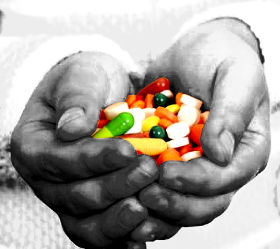Kids' pill risk reviewed
 A new study has found that most antidepressants for children and teens work about as well as placebos.
A new study has found that most antidepressants for children and teens work about as well as placebos.
The most extensive comparison ever of common antidepressants has found most available are ineffective, and some may be unsafe.
“There is little reason to think that any antidepressant is better than nothing for young people,” one researcher said.
But authors are keen to note that lack of available data from published and unpublished trials leads to great uncertainty on the true effects.
Out of 14 antidepressant drugs, only fluoxetine was more effective at relieving the symptoms of depression than placebo, whilst taking venlafaxine was linked with an increased risk of engaging in suicidal thoughts and attempts compared with placebo and five other antidepressants.
However, the truth about effectiveness and risks are unclear because of the small number and poor design of clinical trials. The truth is also obscured by the selective reporting of findings.
But even so, use of antidepressants is on the rise.
Major depressive disorder affects around 3 per cent of children aged 6 to 12 years and about 6 per cent of teenagers aged 13 to 18 years.
In the US, the rate of children and teenagers (aged 0–19 years) taking antidepressants has increased from 1.3 per cent to 1.6 per cent from 2005 to 2012. In the UK, it rose from 0.7 per cent to 1.1 per cent in the same time period.
Sertraline is the most widely prescribed antidepressant in the USA and fluoxetine is the most common in the UK.
Oxford University researchers undertook an enormous analysis of all published and unpublished randomised trials of the most commonly-prescribed antidepressants.
They compared the effects of 14 antidepressants in young people with major depression, ranking the drugs by efficacy (change in depressive symptoms and response to treatment), tolerability (discontinuation due to adverse events), acceptability (discontinuation due to any cause), and associated serious harms (like suicidal thoughts and attempts).
The analysis of 34 trials involving 5260 participants (average age 9 to 18 years) showed that the benefits outweighed the risks in terms of efficacy and tolerability only for fluoxetine.
Nortriptyline was less effective than seven other antidepressants and placebos.
Imipramine, venlafaxine, and duloxetine had the worst profile of tolerability, leading to significantly more discontinuations than placebo.
Venlafaxine was linked with an increased risk of engaging in suicidal thoughts or attempts compared with placebo and five other antidepressants.
The authors warn that due to the lack of reliable data, it was not possible to comprehensively assess the risk of suicidality for all drugs.
Sixty-five per cent of the trials in the review were funded by pharmaceutical companies. Ten were rated as having a high risk of bias, 20 as moderate, and four as low.
Overall quality of evidence for primary outcomes was rated as very low for most comparisons, which restricts the implications of the results for clinical practice.
Dr Jon Jureidini from the University has commented on the report, questioning how many more suicidal events might have been revealed had individual patient-data been available.
He points out, “[for example], in four trials of paroxetine versus placebo, only 13 (3 per cent) of 413 events were reported in the paroxetine group; this seems implausible when individual patient-level data reanalysis of just one of those studies found ten events in only 93 patients given paroxetine (10.8 per cent).”
“The effect of misreporting is that antidepressants, possibly including fluoxetine, are likely to be more dangerous and less effective treatments than has been previously recognised, so there is little reason to think that any antidepressant is better than nothing for young people...
“Patients who take part in randomised controlled trials have a right to expect that maximum benefit will come from the data they generate.
“We doctors and researchers are failing to meet our obligation to research participants and to our patients, and we will only succeed if independent researchers such as Cipriani and colleagues are able to analyse individual patient-level data. Claims that appropriate access to such data is incompatible with intellectual property constraints and patient privacy must be strongly resisted.”








 Print
Print